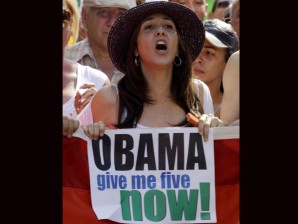WASHINGTON – The United States Thursday defended its decision to grant a visa to the daughter of Cuban President Raul Castro, saying there was no blanket ban on visits by officials from the communist state.
Mariela Castro, a sexologist who backs gay rights, is due to attend the annual conference of the Latin American Studies Association on May 23-26 in San Francisco.
“We don’t link visa policy in cases like this to our larger political and economic and human rights relationship with countries,” State Department spokeswoman Victoria Nuland told reporters.
“There is no blanket restriction on the issuing of visas to Cuban citizens. In all cases, visas are issued for legitimate travel purposes in the United States, including coming for conferences, courses of study, et cetera.”
Some US lawmakers criticized the move, however.
Republican Senator Marco Rubio, whose parents emigrated from Cuba to the United States, blasted the decision as an “outrageous and an enormous mistake.”
“Neither the United States Government nor the Latin American Studies Association should be in the business of providing a totalitarian regime, like the one in Cuba, with a platform from which to espouse its twisted rhetoric,” said Senator Robert Menendez, a New Jersey Democrat.
In a statement issued Wednesday, he called Castro a “vociferous advocate of the regime and opponent of democracy, who has defended the regime’s brutal repression of democracy activists.”
Nuland declined to comment directly on Castro’s visa, citing confidentiality rules.
“It’s really confusing for the United States to grant a visa to the daughter of the dictator Raul Castro at the same time that there is an American, Alan Gross, who is unjustly imprisoned,” Janisset Rivero-Gutierrez of the Miami-based Cuban Democratic Directorate, an exile group, told AFP.
Washington has unsuccessfully pressed for the immediate release of Gross, a State Department subcontractor serving a 15-year sentence in Cuba for espionage.
The United States often rejects visa requests by Cuban officials, academics and artists but restrictions on professional and artistic exchanges have eased under President Barack Obama.
As head of the National Center for Sexual Education, Castro is currently leading a national campaign against homophobia in Cuba.
She earlier led hundreds of gay and transgender Cubans participating in a parade celebrating the International Day Against Homophobia.
Traditionally stigmatized in Cuba, homosexuality was fiercely repressed for many years by the regime, which interned gays in work camps in the 1960s and ostracized them in the 1970s under the rule of Fidel Castro.
Raul Castro succeeded his brother Fidel as president in 2006.
